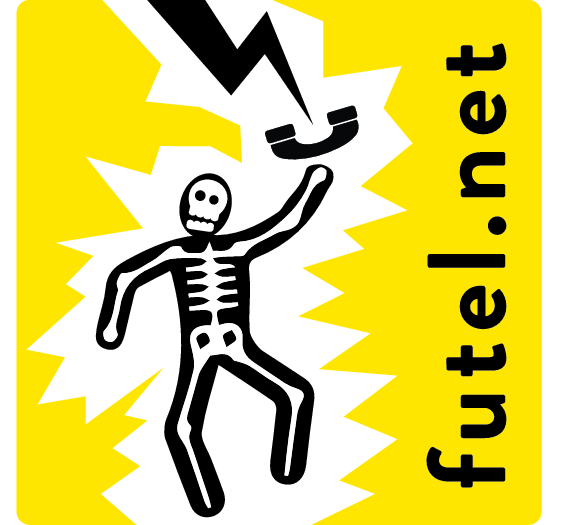Status Report
By Karl Anderson
Director and Chief Handset Cleaner of Futel
Futel has been around for ten years! Longer than that, but events have gotten in the way of publishing, and I’m not just referring to the fascist direction that this nation and its people are taking. But here we are, history is being written.
The Plan Behind Futel, or Lack Of
The plan was never to reveal anything about what is behind Futel. The plan was to install the phones, make them available for the people who wanted to make calls, and provide ways for people to interact. Would people use them? Was there a point? These were questions that we didn’t know the answer to. But we didn’t need to know, because we were just finding out by doing it. One would think this would be an easy project to describe, and I just did in one sentence, but it is very frustrating to talk about because of all the irrelevant questions. Why do you want to do this? What is the goal? Do you know what you are doing? No, we don’t know. We just want to do it.
But one of the biggest strengths of the project was that it didn’t need to explain itself. When we started, there was no publicity. We didn’t hype it or warn anyone. There wasn’t even any pertinent copy on the phone at first, it was just a payphone. At the time, there were still payphones out there in the wild, so it had cover. We didn’t care if anybody got it or not. If some people wanted to make a call, and other people were confused, then the project would be successful.
That’s how art works, there is something that is being expressed, but the actual experience is in the head of the the experiencer. And we have to admit that Futel is partly an art project. We never wanted to claim that, even to ourselves. One reason is that it tells people about some of our motivation, instead of letting them decide for themselves. Another is that by ignoring any artistic desire, we can avoid pretense. Nobody needs to try to understand it. We are doing it because we need to and there isn’t anything to figure out. We call it a social service project, which it is, but we’ve never had to have thoughts about how people were affected by the experience.
It was made easier because we didn’t care if anybody knew who we were. We didn’t need to promote ourselves or position the project as part of our creative careers. Most people involved with Futel use pseudonyms, and I’ve usually done that for previous projects. Why use my name, what’s important about me? If the recognition is attached to a fragment of a personality that doesn’t have all that sloppy humanity, it’s more focused. But I abandoned that for Futel years ago. I fund Futel by pursuing grants and donations. It’s easier to attach my name to a proposal. There’s more assurance that the money is being used as intended.
So while the project has always been creative, it hasn’t drawn attention to that. The work speaks for itself. But we can’t deny the artistic angle. Most of the grants have been from arts organizations, and the less art-oriented proposals still reference the cultural aspects. To have that make sense Futel needs to interface with other artists, it can’t just be enigmatic. And to be effective as a social service we need to interact with groups like neighborhood associations and civic-minded organizations. Really, no public project works unless it learns from other people, otherwise it will lose relevance.
The Challenges and Rewards of Running a Telecom Empire
It’s also getting harder to ignore the personal aspects, and there will always be times when maintaining a human life and family will get in the way of running a phone company. There has been a lot of solitary work, many rewards but many periods in between them, and in general a large amount of rejection, failure, and doubt. It usually isn’t worth mentioning because any worthwhile project will involve those, and complaining isn’t interesting unless it’s entertaining or educational.
I’ve written a lot about Futel, and it’s all been true, surprisingly, but it’s always been about the collective project. I’ve maybe acknowledged the challenges, but those have always just been an environment to continue to exist in. It’s been worth it, otherwise it’d be kind of stupid to be doing this work for ten years. Futel is run by volunteers. What do we give? Time, money, supplies, and stress, or at least hassle. What do we get? Everyone gets something, or we wouldn’t be doing this.
There’s the knowledge that we are doing good. This is not some handwavey thing, we all need to know that we are worthwhile.
There’s the knowledge that we are creating something which is being experienced by others. I’ve talked to random people who knew what the project was before I explained it to them, and it is an interesting experience to know that I have some small effect outside of my immediate reach. This can sometimes turn into direct social rewards like recognition, having another human take the time to say that they appreciate something. I was walking down the street in Old Town years ago and someone started calling to me. Of course, I ignored them, but they caught up to me and told me that they had seen a talk I had given about Futel and how glad they were that the project existed. They made an effort to communicate that to me on the street. It was a real reward!
There is community. We have an identity, we are the people making the project work. We belong to something and we can point to it.
And there’s also the ability to just do the work, the effort itself. It keeps us alive. I often joke that projects keep me from committing suicide, and it’s true! I’m not going to kill myself, but I’m going to find something to do instead, and this is one of them. I don’t think anyone else on the project feels that way, but having the capacity to expend that effort is our privilege. We do the work and figure out the effects. The work itself is part of the feedback. Then we can decide whether to keep doing it.
The problem with these benefits is that they’re all in our minds. It’s a completely ad-hoc effort to fulfill an imperative without much rationalization. It seems to be positive for us and it fills a role for the community. But all of these reasons are internal. We rationalize them in our own heads, and feedback from other people is like glimpsing shadow puppets on the wall of Plato’s cave. It can all get driven away. I was so excited about having this project survive for ten years. Then I was stricken by events, experienced a minor traumatic brain injury, my family got shaken up, a close next-door neighbor died. Large parts of my life were swept away, some of them came back, others didn’t.
Complaining about personal issues with being alive isn’t going to be interesting. Everyone has problems, many more than I do, and as an operator I speak to Futel users who seem much worse off. And the current fascist push is abusing and destroying a larger number of the people around us than before, and with greater horrible consequences. So I feel like apologizing for talking about myself. Whatever, everybody’s life shrinks. It’s just that mine is being reevaluated for me, and that’s relevant to Futel.
The good thing about an established system, one that has a nonprofit board or that people depend on for wages, is that it has a lumbering inertia. Enough people need it to stay the course that the influences are reinforced, and the issues in one person’s head can stay there. A term for this is “bus proofing”, in that the endeavor can survive any one person being hit by a bus and killed. A process run by mad people is much more dependent on the zephyrs of their thoughts.
The project was so much more powerful as a faceless entity. When we were just putting down payphones and not telling anyone what we were doing, we blended in with the institutions that actually run our lives. By now the telecom companies are processes that are generated by the environment, and the individual carriers are like eddies in that weather pattern. We could just show up and do our thing and hide in the scenery. Futel wouldn’t exist without that kind of agility, of course, but the drawback is that we have to reveal ourselves and communicate like humans sometimes, because that’s what we are and how we live.
Maybe this is a sign of my immaturity as an artist and the maturity of the project - the bad kind of maturity, the kind that signals that growth and change has stopped. There’s a plinth on Mt. Tabor that glorified a statue of a historical evil Portland white man until it was knocked down during the Black Lives Matter protest times. A sculptor replaced it with a large bust of York, who participated in the Lewis and Clark expedition as a slave. It was a beautiful and powerful work and was eventually destroyed by a white supremacist group. The sculptor didn’t reveal himself until afterwards, when that would further the work and the preservation of it’s motivation. The work stood for itself. I think that’s how every truly successful creative person operates. They make the thing and put it out there - and that’s the work, not just the creation, but getting the creation into people’s experience. Sometimes it gets into people’s heads, and sometimes it doesn’t, but they just do the work without knowing the outcome. Then they do it again and again, knowing that any particular effort might succeed, and it might not.
Status Report
So why all this talk about myself and my feelings? Because Futel is a mature project. Ten years! And because I’m not a mature artist, or director, or handset cleaner, or whatever I am. I’m the one who writes the rants. It’s a good way to be, even for someone this old. Can we get to the status report yet? Nobody knows the status of Futel. I am the person most immersed in it and I have no clue. It does a lot for many people, including us, the people who do the work. I can’t tell you where Futel will be in the future. I don’t think I have those qualifications, I’m someone who thinks running a free payphone company is a good idea. But today it is doing well. We will see more problems, and possibly further essays in the first person, for which I apologize in advance, but we will continue.
Archive
